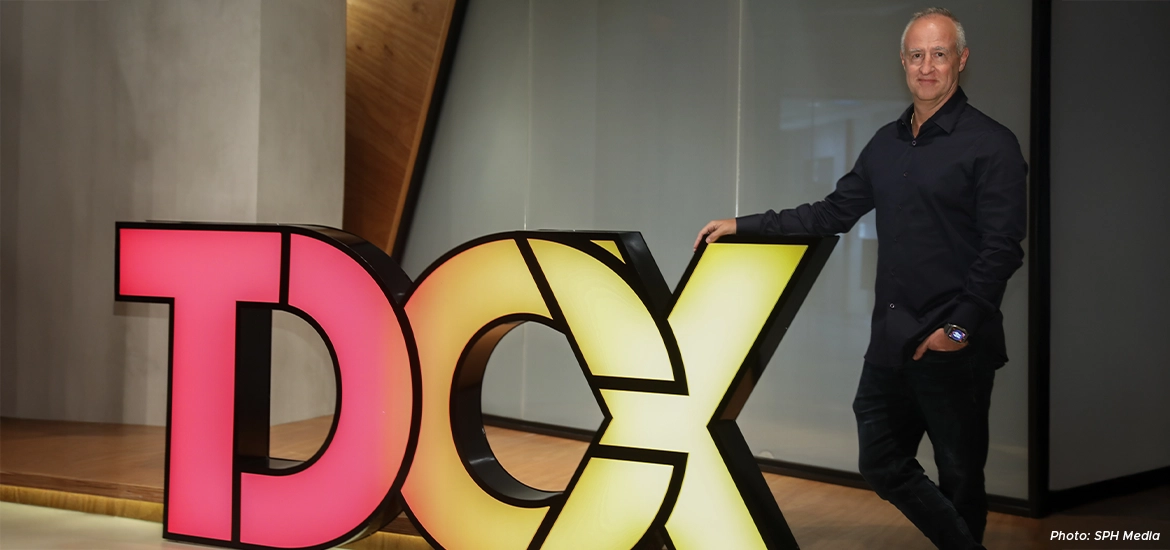The entrepreneur, however, was undeterred and soon founded Teledirect – the former name of TDCX – in 1995. “I think learning from the mistakes, after so many failures, (I) eventually got to a point where you get it right.” Before this, Junique had tried his hand at other business ventures in France but those did not last.
Big break
Clinching the business from the payments powerhouse American Express was a big break for Junique – it provided him with a much-needed track record, and it was paying him on time.
Soon, he got Pacific Internet as the next client. Similarly, this client required the outsourced staff from TDCX to work at its premises, like American Express, freeing Junique from investing in infrastructure.
Then a global advertising company and an international insurer were added to his clientele. Soon, these clients saw the complementarity between TDCX and their business, and wanted to own a share in it.
Junique sold a 40 per cent stake in his company for a six-figure amount to the advertising behemoth in 1997.
The money gave comfort to the self-employed then 30-year-old, in knowing that he was making as much as his salaried peers.
The stake sale marked the start of him making inroads into the region.
It also made him realise that he had not negotiated the shareholding agreement very well.
“This was a big multinational, and I was a nobody with a very small business. So my bargaining power was not very strong… Still, it was a good deal for me at the time, given where I was.”
He re-acquired his stake from the minority shareholder in 2018 at 120 times the price at which he sold it, after assessing that the 20-year partnership was not as relevant as it was intended to be.
Then came COVID, which disrupted the business of TDCX as its travel and hospitality clients were severely hit. It was the first time that the company had to lay off workers, albeit only a small percentage of its staff was affected, as clients from streaming platforms and digital advertising picked up the slack from those in the upended sectors.
TDCX marked the end of COVID with a stock market flotation on the New York Stock Exchange in 2021. It planned to use the shares for acquisitions to catapult it to the global arena.
“There were different forces that we were trying to address. One of them is that we had to become global at the time. We were regional, and we were transitioning into a global company.
We had to, because our clients were global, and we were concerned that they would want to narrow the number of suppliers and only work with big global suppliers,” said Junique.
“We need to raise our profile. We need to raise capital. We need to acquire companies in other geographies, or do some organic growth and have more publicity.”
Not retiring
By then, the corporate honcho was already 56 years old – but in his own words, he became “even more crazy with age”.
Junique said it’s risky in this business for the company to keep still and slowly see it decline. So he feels that the only way forward is to take calculated risks.
A re-rating of the sector ignited by lowball takeovers by some industry players prompted Junique to review TDCX’s public listing status.
He went on to delist TDCX in 2024.
When Junique sold his 40 per cent share in 1997, he had a three-year plan for TDCX to go regional, and that dream was upgraded at the time of the public listing, to become a global player. Now, he has a bigger dream, but he is keeping it under wraps from the public for the time being.
While his competitors managed to scale up a lot faster by diluting their equity to raise funds, Junique took a slower route but kept the reins as he wanted to be the one driving the business.
As the group evolved and headcount increased, Junique’s role transitioned from being an operator to an orchestra conductor. But the change was not without struggles for him, as he had to remind himself not to micro-manage and at times questioned his own usefulness. Meanwhile, he decided that his children will not take over TDCX, so as to spare them the pressure of being the boss’s offspring. Also, it will be fair to his employees who have worked hard to have a shot at leading TDCX. But they would have to wait a while.
Junique, who sees the 96-year-old Hong Kong billionaire Li Ka-shing as his beacon, said: “I’m not ready to retire... I would like to continue in this capacity, because it’s interesting.”









